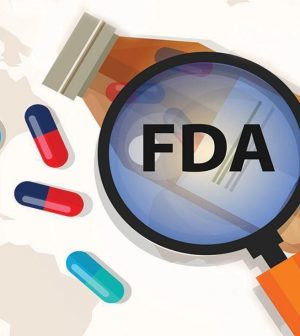- 7 Best Breads for Maintaining Stable Blood Sugar
- Gelatin vs. Collagen: Which is Best for Skin, Nails, and Joints?
- The Long-Term Effects of Daily Turmeric Supplements on Liver Health
- Could Your Grocery Store Meat Be Causing Recurring UTIs?
- Are You Making This Expensive Thermostat Error This Winter?
- Recognizing the Signs of Hypothyroidism
- 10 Strategies to Overcome Insomnia
- Could Artificial Sweeteners Be Aging the Brain Faster?
- Techniques for Soothing Your Nervous System
- Does the Water in Your House Smell Funny? Here’s Why
FDA Panel Rejects Lilly’s Cancer Drug Tested Only in China

A new lung cancer drug that has only been tested in China was soundly rejected by an advisory panel to the U.S. Food and Drug Administration on Thursday.
Known as sintilimab, the treatment is a type of immunotherapy that unleashes the immune system to attack tumors. It was developed and tested in China by Innovent Biologics, which entered into an agreement with Eli Lilly that would have allowed Lilly to seek approval to market the drug in the United States, The New York Times reported. It was to be used alongside chemotherapy for patients with metastatic non-small-cell lung cancer.
“We had hoped that sintilimab could have played a positive role for patients and the U.S. healthcare system through an aggressive pricing strategy,” Lilly said in a statement released Thursday. “Along with Innovent, we will continue to work with the FDA as it completes its review of the sintilimab application.”
Dr. Richard Pazdur, who heads the FDA’s oncology unit, explained on Thursday why he had backtracked from a far more welcoming attitude in 2019, when he said the agency might consider a drug tested solely in China.
“Over the past two or three years, this country has experienced tremendous social change,” he said during the meeting, the Times reported, and diversity in clinical trial participants has become a critical issue.
A drug tested only in China is “a step backward,” he said.
More troubling was the results of an FDA staff analysis that skewered the methodological grounds of the Chinese trial, the Times reported. It cited a failure to provide patients in the control group with an approved therapy that is standard of care; questioned the competence and experiecne of some of the investigators; noted a patient population that was younger, had more men, and had fewer smokers than typical U.S. lung cancer patients; and criticized use of an endpoint that isn’t always reliable.
Lilly had promoted its FDA application by saying that it wanted to use sintilimab as a wedge to break the sky high prices of many cancer immunotherapies.
Already on the market are several other similar dugs, which make cancers vulnerable by blocking a protein that tumors use as sort of an invisible shield. These immunotherapy drugs treat such cancers as colon, breast, liver and lung, and carry list prices that are nearly identical — about $150,000 a year per patient.
Lilly said it would charge 40 percent less if its drug were approved. Sintilimab costs $6,000 a year in China.
Breaking the price lock on such drugs is “a big deal,” Brad Loncar, a biotechnology industry investor, told the Times.
“I’m not aware of any precedent of a company, especially of Lilly’s size and credibility, announcing that a discounted price like this is how they planned to innovate,” Loncar noted.
Now, he added, the near certainty that the drug application would be rejected by the full agency “means that a real option for substantially lower drug prices is being closed in the U.S.”
But Dr. Scott Ramsey, a health economist and cancer specialist at Fred Hutchinson Cancer Center in Seattle, was among those who were skeptical of Lilly’s motives. “Yeah, right,” he told the Times.
“Are they talking about the stranglehold on prices that their current drugs contribute to?” Ramsey asked. “Maybe they could start by knocking 40 percent off their price” for Cyramza — a stomach cancer drug with a list price of $13,400.32 to $15,075.36 per month — and Verzenio, a breast cancer drug with a similar price tag.
“I don’t buy it,” Ramsey said.
More information
Visit the U.S. National Cancer Institute for more on lung cancer treatments.
Source: HealthDay
Copyright © 2026 HealthDay. All rights reserved.










